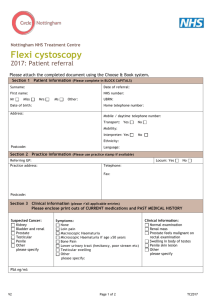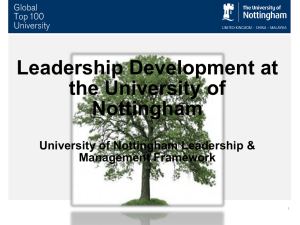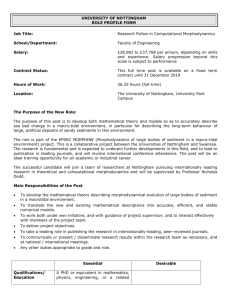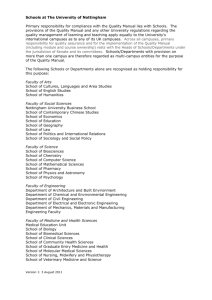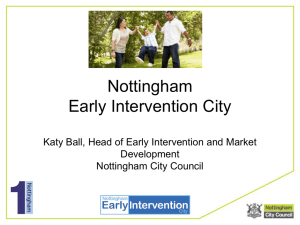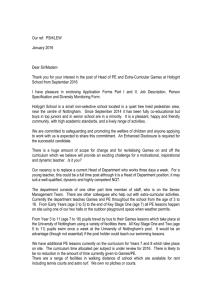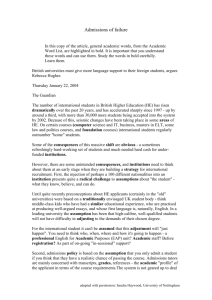Job Plan
advertisement
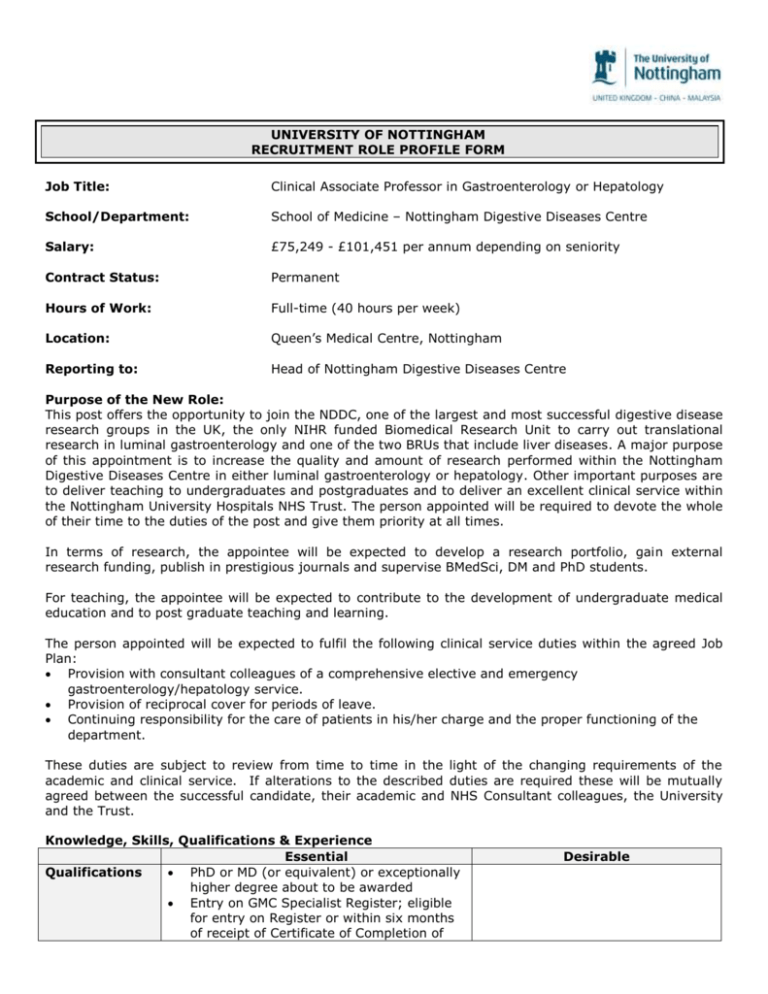
UNIVERSITY OF NOTTINGHAM RECRUITMENT ROLE PROFILE FORM Job Title: Clinical Associate Professor in Gastroenterology or Hepatology School/Department: School of Medicine – Nottingham Digestive Diseases Centre Salary: £75,249 - £101,451 per annum depending on seniority Contract Status: Permanent Hours of Work: Full-time (40 hours per week) Location: Queen’s Medical Centre, Nottingham Reporting to: Head of Nottingham Digestive Diseases Centre Purpose of the New Role: This post offers the opportunity to join the NDDC, one of the largest and most successful digestive disease research groups in the UK, the only NIHR funded Biomedical Research Unit to carry out translational research in luminal gastroenterology and one of the two BRUs that include liver diseases. A major purpose of this appointment is to increase the quality and amount of research performed within the Nottingham Digestive Diseases Centre in either luminal gastroenterology or hepatology. Other important purposes are to deliver teaching to undergraduates and postgraduates and to deliver an excellent clinical service within the Nottingham University Hospitals NHS Trust. The person appointed will be required to devote the whole of their time to the duties of the post and give them priority at all times. In terms of research, the appointee will be expected to develop a research portfolio, gain external research funding, publish in prestigious journals and supervise BMedSci, DM and PhD students. For teaching, the appointee will be expected to contribute to the development of undergraduate medical education and to post graduate teaching and learning. The person appointed will be expected to fulfil the following clinical service duties within the agreed Job Plan: Provision with consultant colleagues of a comprehensive elective and emergency gastroenterology/hepatology service. Provision of reciprocal cover for periods of leave. Continuing responsibility for the care of patients in his/her charge and the proper functioning of the department. These duties are subject to review from time to time in the light of the changing requirements of the academic and clinical service. If alterations to the described duties are required these will be mutually agreed between the successful candidate, their academic and NHS Consultant colleagues, the University and the Trust. Knowledge, Skills, Qualifications & Experience Essential Qualifications PhD or MD (or equivalent) or exceptionally higher degree about to be awarded Entry on GMC Specialist Register; eligible for entry on Register or within six months of receipt of Certificate of Completion of Desirable Research Experience Training (CCT) at time of interview. All candidates will need to hold full GMC registration with a license to practice at time of appointment MRCP (UK) or equivalent Prestigious publications in peer-reviewed journals Experience of gaining ethical and R&D approval for studies Teaching Experience Clinical Experience Management & Administrative Experience Other Attributes Statutory/ Legal Experience of supervising junior doctors in training Aptitude and ability to teach undergraduate medical students Ability to teach research and clinical skills Ability to offer expert clinical opinion on a range of Gastroenterology/Hepatology problems Ability and experience to do out-of-hours endoscopy for acute GI bleeding Ability and experience to contribute to the University of Nottingham goals, for example through serving on committees Experience of audit Ability and willingness to work within the Trust and NHS performance framework and targets Ability to work in a team Good interpersonal skills Enquiring, critical approach to work Caring attitude to volunteers and patients Ability to communicate effectively with volunteers, patients, relatives, GPs, nurses and other agencies Commitment to Continuing Medical Education and the requirements of Clinical Governance and Audit Satisfactory enhanced disclosure from the Disclosure and Barring Service Proven ability to attract research funding Experience of supervising postgraduate students Ability to manage a research portfolio Experience of teaching undergraduate students Experience of teaching postgraduate students Because of the nature of the work for which you are applying, this post is exempted from the provisions of Section 4 (2) of the Rehabilitation of Offenders Act 1974 by virtue of the Rehabilitation of Offenders Act 1974 (Exceptions) Order 1975. Candidates are therefore, not entitled to withhold information about convictions, which for other purposes are “spent” under the provisions of the Act, and in the event of employment any failure to disclose such convictions could result in dismissal or disciplinary action by the University. Any information given will be strictly confidential and will be considered only in relation to an application for positions to which the Order applies. Applicants will be considered on an equal basis, subject to the relevant permission to work in the UK as defined by the requirements set out by the UK Border and Immigration Agency. Please visit http://www.ukba.homeoffice.gov.uk/ for more information. Informal enquiries may be addressed to Professor Robin Spiller, Tel: 0115 8231090, Email: robin.spiller@nottingham.ac.uk and/or Professor Guru Aithal, Tel: 0115 8230452, Email:guru.aithal@nottingham.ac.uk. Please note that applications sent directly to these email addresses will not be considered. Job Description The University of Nottingham invites applications for a Clinical Associate Professor (Senior Lectureship) in Gastroenterology/Hepatology. The person appointed will be expected to have a primary research commitment in conjunction with service and teaching responsibilities. Our preferred model is for a 5+5 model (i.e. 5 University and 5 NHS programmed activities), but this will be negotiable. Gastroenterology and hepatology in Nottingham have a wide range of research opportunities and our aim is to appoint the strongest candidate regardless of precise research interests. We will consider high level applicants in any area of luminal gastroenterology or hepatology. However candidates with an interest in translational medicine relevant to the theme of the Nottingham Digestive Diseases Biomedical Research Unit would be especially welcomed. For individuals wishing to conduct laboratory research there are substantial available facilities. There is also an ongoing long standing collaboration with the Nobel Prize winning Sir Peter Mansfield Magnetic Resonance Centre (SPMMRC) exploiting the use of MRI to assess gastrointestinal function which the candidate would be able to benefit from. Nottingham has also been established since 2008 as one of the three Biomedical Research Unit (BRU) in gastroenterology/hepatology in the UK to conduct and facilitate translational research. The BRU is focused on infection, inflammation and its long term consequences. The BRU is part of the Nottingham Digestive Diseases Centre which is both the largest clinically based UK research grouping in GI/Liver disease in the UK with 38 Principal Investigators and also constitutes the largest dedicated academic training programme in gastroenterology in the UK, with 15 Research Council Training Fellows and 34 non clinical PhDs. Nottingham has an impressive record of recruitment to phase1-IV clinical trials in gastroenterology and hepatology with 1792 and 710 subjects respectively in 2012-13. Research in the Nottingham Digestive Diseases Centre GI/liver research in Nottingham Academic Medical Gastroenterology/Hepatology in Nottingham is internationally-renowned and has achieved a 5* grading in the last Research Assessment Exercise to grade individual departments. At its core are 8 University Clinical Academics (6 full Professors and 3 Senior Lecturers) with extensive, mature, well-funded research programmes and research expertise ranging from molecular and cellular biology through patient-based research to clinical trials and GI epidemiology. They work closely with the NHS gastroenterologists/hepatologists, many of whom also have active research programmes. Academic gastroenterology, hepatology and gastrointestinal surgery forms part of the Nottingham Digestive Diseases Centre (NDDC), a co-operative research grouping from both University and NHS Trust comprising medical and surgical gastroenterologists, hepatologists and non-clinical scientists, which we believe to be the largest clinically-based gastro-intestinal research grouping in the UK. The NDDC is based mainly on the QMC campus but also includes researchers in the University of Nottingham in Derby Hospitals and laboratories. Current research interests in gastroenterology/hepatology The research interests of the NDDC are broad covering both luminal gastroenterology, hepatology and gastrointestinal surgery. There is specific expertise in peptic ulcer and H. pylori associated diseases, C. difficile infection, inflammatory bowel disease, neurogastroentreology, and cirrhosis and portal hypertension, non-alcoholic fatty liver diseasae, genetics of liver injury and chronic hepatitis C. Professor Robin Spiller’s research programme in neurogastroenterology focuses on pain and motility disturbance in IBS. Current projects include a large clinical trial of mesalazine in IBS with diarrhea, colonic MRI imaging and functional assessments in constipation as well as examining the effect of novel secretagogues. There are also ongoing projects studying the role of colonic gas in causing symptoms in IBS patients responding to a low FODMAP diet. Other themes include the role of changes in colonic microbiota in causing symptoms of post infectious IBS and in relapse in C. difficile infection. While Dr Mark Fox was a member of the department 2009-2013 he pioneered the use of high resolution oesophageal manometry and developed MRI techniques to define the abnormalities of gastric function in functional dyspepsia.both of which are now used in clinical practice. Professor John Atherton conducts translational and basic research in Helicobacter pylori pathogenesis and mechanisms of upper GI diseases. Professor Chris Hawkey is interested in inflammatory bowel disease, non-steroidal anti-inflammatory drugs, cancer prevention and the conduct of clinical trials, which currently include the HEAT trial examining the benefit of H. pylori eradication in the prevention of aspirin associated GI bleeding. Professor Yash Mahida is interested in mucosal biology (including GI stem cells) and C. difficile pathogenesis. Dr Tim Card and Dr Joe West conduct a wide range of GI epidemiology and observational studies in many areas including IBD, GI bleeding, celiac disease and liver diseases. Professor Krish Ragunath is an academic endoscopist interested in advanced imaging and pre-cancer detection and treatment in the GI tract. Dr Gordon Moran has broad research interests in inflammatory Bowel Disease and has expertise in the neurohumoral regulation of appetite in relation to inflammatory disorders of GI tract. Professor Guru Aithal, co-chairs the international drug-induced liver injury (DILI) consortium which has led to recent discoveries in genetic susceptibility to DILI; there is an on-going project investigating genetic and circulating biomarkers of DILI. He also established a translational research group in Nottingham investigating novel tests to stratify NAFLD, life style and pharmacological interventions in NAFLD. In collaboration with SPMMRC, there are a number of work streams developing MR methodology to evaluate chronic liver diseases. Dr Neil Guha, Associate Professor in Hepatology is an expert in the development and evaluation of biomarkers in liver disease; he developed the concept of ‘clinical utility model’ of non-invasive markers of liver fibrosis; his current work includes stratification of chronic liver disease using tissue, serum and imaging markers both in primary care and hospital based cohorts. Dr Neil Guha and Prof Guru Aithal were winners of the National NHS Innovation Award in 2013. Professor Will Irving, Professor of Virology established ‘Trent HCV cohort’ in 1992; with the involvement of Dr’s Steve Ryder and Brian Thomson, this cohort has contributed to research of international importance in the last 2 decades. Recently Prof Irving set up HCV research UK, a national consortium with an ambition of collating 10,000 HCV patients; HCV research UK is hosted by Nottingham Digestive Diseases BRU. Patients and infrastructure of HCV research UK supports ‘STOP-HCV’, another MRC funded programme that aims to stratify HCV patients with in-depth phenotyping to optimise therapy. Professor Jonathan Ball leads the anti-HCV monoclonal antibody discovery programme; currently a EUFP7 funded study is evaluating the role of human monoclonal antibody in the prevention of post-transplant HCV. Prof Ball also leads pre-clinical evaluation of HCV vaccine candidates. We have many other research programmes, which we are actively trying to translate basic science to clinical practice. These include extensive internationally-competitive research in bacteriology and virology, as well as research on drug targets, delivery and formulation conducted in our award-winning School of Pharmacy. Further details of individual academic gastroenterologists and their research interests can be found at: http://www.nottingham.ac.uk/medicine/about/nddc/index.aspx Clinical research training Medical gastroenterology/hepatology has a particularly proud record of clinical research training with more NIHR Academic GI “Walport” training posts than anyone else in the UK. Additionally, we currently have 13 Clinical Medical Gastroenterology trainees working full-time towards PhDs, or occasionally MDs. PhD/MD training for clinicians in the School of Medicine is closely supervised and carefully structured: clinical students take part in a taught course which has been developed specifically for medically-qualified graduates undergoing research training. Gastroenterology research trainees also attend vibrant weekly academic meetings with all consultant and trainee gastroenterologists plus GI pathologists and a GI paediatrician. These meetings consist of critical appraisal of published research with implications for Nottingham research and clinical practice (1 hour) and case-based clinical training (45 minutes). There are also frequent Medical Gastroenterology research meetings, an invited seminar programme with external speakers, and regular research meetings based in other Research Institutes. The Clinical Component of the Clinical Associate Professor (Senior Lecturer) post Our preferred model is for a 5+5 model, but this will be negotiable. The precise content of the clinical service PAs will be negotiable depending on the skills and interests of the appointee. As well as outpatient, and endoscopy work, candidates would be expected to contribute to the acute gastroenterology rota and the rota for in-patient ward cover. All consultants in Gastroenterology are expected to contribute to education and training of undergraduates and postgraduates, and University-employed consultants are expected to set an example, particularly in terms of student feedback, exam question setting and examining. The Digestive Diseases and Thoracic Directorate Recent service reconfiguration has allowed the opportunity to develop a directorate with medical and surgical sub-specialities integrated along the lines of care pathways rather than historical boundaries. The new integrated directorate will allow service provision, resource utilisation and operational management to be more streamlined and efficient. Managerial structure of the directorate is as followsClinical Director Dr Iain Cameron Directorate General Manager Assistant General Manager Medical Services Manager Mrs Gail Walder Mr Richard Doane Miss Rachael Briggs Directorate Finance Manager Deputy Finance Manager Directorate HR Manager Ms Candice Roberts Ms Sarah Stephenson Mrs Debbie Hunt Directorate Clinical Lead Matrons Mrs Anne Scott Sr J Barker, Sr R Patel & Dr G Elwood Heads of services: Gastroenterology & Nutrition– Dr M James Endoscopy- Professor K Ragunath Upper GI and Thoracic – Mr J P Duffy HPB – Mr I Cameron Colorectal – Mr C Maxwell-Armstrong Directorate Medical Staff Luminal NHS Hepatology NHS University: Luminal Hepatology Dr Dr Dr Dr Dr Dr K Teahon A Jawhari T Bowling S Samuel N Lewis (Locum Consultant) M Teli Dr S D Ryder Dr M James Dr E Wilkes Prof C J Hawkey Prof J C Atherton Prof Y R Mahida Prof R C Spiller Prof K Ragunath Dr G Moran Prof G P Aithal Dr I N Guha (Associate Professor) GI Epidemiology Dr J West (Dept of Public Health) Dr T Card Hepato-pancreaticobiliary Surgery Mr I J Beckingham Mr A Brooks Prof D N Lobo Mr I Cameroon Mr D Gomez Mr C Macutkiewicz (Locum consultant) Colorectal Surgery Mr J F Abercrombie Mr C Maxwell-Armstrong Mr M H Robinson Prof J H Scholefield Mr J P Williams Mr A Acheson (Associate Professor) Mrs K Walter Mr A Banerjea Upper GI Surgery Mr N T Welch Mr S L Parsons Mr J Catton Thoracic Mr A Martin-Ucar Mr J P Duffy Mr A Majewski Ms E Internullo Clinicians are supported by 3 endoscopy nurse practitioners and nurse specialists - 6 hepatology, 2 alcohol liaison service, 2.5 inflammatory bowel disease, 1 each in nutrition, in-patient and out-patient coordination. Clinical Activity We are currently in the process of re-structuring our clinical activity so that we can provide more dedicated consultant led care. We are identifying our emergency, scheduled and ambulatory care pathways more accurately. We are partway through this process and as a result most of our emergency care pathway will be provided on the QMC campus with a dedicated consultant led team supervising. We are finalising details of our scheduled care pathways and are working with the independent sector treatment centre for ambulatory care. Teaching Both campuses within Nottingham University Hospitals NHS Trust are major centres for undergraduate and postgraduate education and teaching. The successful candidate will be expected to play a full role in undergraduate and postgraduate teaching. Governance and Audit Nottingham University Hospitals NHS Trust is committed to the development of Clinical Governance. The approach taken is to develop action plans at a directorate level. Each member of the medical staff is expected to take an active role in clinical governance activities within their directorate and each directorate has a Consultant nominated as Clinical Governance lead. The activities include, (but are not restricted to) audit, incident reporting, review of complaints, risk management, CPD and Evidence Based Practice. Other Duties as Agreed The person appointed may eventually wish to take on other roles. Positions such as Clinical Director are offered by the Trust on fixed-term contracts. Any positions offered by anyone outside the Trust (e.g. Training Programme Director, Regional College Advisor, Royal College Representative etc) must be discussed with the Clinical Director and colleagues in advance of the position being accepted, so that consideration can be given to the job plan and whether this needs to be revised should the additional role be accepted. Job Plan The following draft ‘Job Plan’ reflects our best assessment of what the final plan will be, based on 10 PAs. The University and Trust are moving towards annualised job plans to ensure the maximum flexibility and responsiveness of the service. The weekly job plan outlined below is the most likely starting point although it is likely that sessions will change both in location and type to fit with service needs. The Job Plan will be subject to regular review. Candidates who are unable, for personal reasons, to work full-time, may be eligible to be considered for the post on a part-time basis. In such a case, modification of the job content would need to be discussed with the University and the Trust. Programmed Activities: Direct Clinical Care: Out of hours – predictable (weekend ward rounds/ urgent procedures) Emergency duties - unpredictable Ward rounds (+ related admin/ meetings) Out-patient clinics Clinical Diagnostic Work (endoscopy) / GI physiology/ Queen’s Day Case Unit Patient related administration Multi-disciplinary meetings Supporting Professional Activities (clinical) 0.5 Suppl 0.5 1-2 0.5–1 0.5 0.25 0.75 + see Academic Sub Total Up to 5* (*distributed from the above by negotiation) Academic Academic including Academic CPD Teaching, Sub Total TOTAL CLINICAL SERVICE PAs On-call supplement: Rota Frequency: Category: On-call Supplement: Possible Timetable DAY Monday Tuesday Wednesday Thursday Friday 5 (to include 0.5-1.0 of clinical SPA) 5+ 5 1:10 A 3% AM Research + MDM Research Clinic Research CPD/ GI physiology PM Research Endoscopy Research Clinic Teaching and Admin Ward rounds: In-patient gastroenterology is divided into ‘liver’ and ‘luminal’ service with two consultants (one hepatologist and one luminal gastroenterologist) leading care at any given time. The new appointees will oversee in-patient care for about 15-20 patients in rotation with other Consultants. We are committed to provide a consultant-led service and aim to have daily senior ward rounds. Each consultant aims to do 4 ward rounds (including 1 teaching round) per week while covering the ward. One day of the week, the specialist registrar leads the ward round with appropriate discussion with the consultant. During time on the ward, fixed morning commitments will be scheduled to start at the end of ward rounds. On-call commitment will be 1:10, supported by junior staff. This post is deemed to be Category A and an allowance is paid for being on-call, which is currently category A @ 3%. Consultants cover acute gastroenterology and endoscopy for a week at a time and during this week they cancel all fixed commitments. Administrative Support Office accommodation and administrative support will be provided by the Trust and University, as will a PC with Email and Internet access. All consultants are required to check their hospital Email regularly. Professional Standards The Clinical Director is managerially responsible for all activity and personnel in the NHS directorate in which the consultant works. The Medical Director, Dr Stephen Fowlie, has overall responsibility for the professional performance of consultants, working within NUH. All consultants are expected to comply with management arrangements in place, to follow the guidelines on practice laid down by the General Medical Council’s “Maintaining Good Medical Practice”, and to be accountable to the Trust for their actions and the quality of their work. A yearly Consultant Appraisal and Job Plan review is carried out. Ethics of Clinical Practice Committee (ECPC) The Ethics of Clinical Practice Committee has been in existence in Nottingham since 1994. It is a multidisciplinary forum with representation from both campuses as well as PCT and lay representation. The remit of the ECPC is to consider clinical issues in relation to existing and developing policies as well as ethical dilemmas that arise with clinical issues and resource allocation. The committee exists to help clinical staff reflect and discuss issues rather than being directive, but it is able to provide a consultation service if requested. The current Chair, Dr Tash Masud, Health Care of the Elderly, can be contacted via the City Hospital switchboard or by e-mailing the administrative secretary (jhayes1@nuh.nhs.uk). Conditions of Service This appointment will be on the terms and conditions of the new Consultant contract. The person appointed will be expected to adhere to local policies and procedures and to take note of the standing orders and financial instructions of the Trust. In particular, where the consultant manages employees of the Trust, they will be expected to observe the employment and Human Resource policies and procedures of the Trust. All employees who have responsibility for other staff need to ensure that individual performance is reviewed and a personal development plan is jointly agreed, at least annually. Managers and supervisors will work jointly with their staff to ensure all developmental actions that are agreed during the review take place and are evaluated during the following year. Health & Safety All medical and dental staff under contract to the Trust will be expected to be familiar with and adhere to the Health and Safety Policies of the Trust. All accidents must be reported to your Clinical Director, and you must submit a completed accident/incident report form and support accident prevention by reporting potential hazards. A copy of the Department’s Health and Safety policy will be available to the successful candidate. Included in these policies is the requirement that all new medical staff will provide evidence that they are not carriers of Hepatitis B before appointment, and accept immunisation if not already immune. The University of Nottingham The University of Nottingham is a global-leading, research-intensive university with campuses in the UK, Malaysia and China. Our reputation for world-class research has yielded major scientific breakthroughs such as Nobel-winning MRI techniques, drug discovery, food technologies and engineering solutions for future economic, social and cultural progress. Already ranked among the UK’s elite universities and global polls for research excellence, our reputation for world-class research has been further enhanced with the 2008 results of the Research Assessment Exercise (RAE). In addition to scoring highly in quality rankings covering major disciplines in science, engineering, the social sciences, medicine, business and the arts, it is Nottingham’s increase in research power rankings which demonstrate the impressive volume of excellent research which is carried out. We are now ranked in the Top 7 of all British universities and are one of only two institutions to move into the UK Top 10 since 2001 – an increase of seven places, making us the highest mover of any university. Following the RAE results, 90% of all research at Nottingham has been classified of an ‘international standard’ and 60% as ‘world-leading’ or ‘internationally excellent’. The main University campus is set beside a lake, in an extensive belt of woodland, parks and playing fields. The 330 acre University Park Campus is the focus of life for more than 32,000 students and houses the majority of the University’s academic schools and many of the central Services. The Jubilee campus is situated 2 miles away from the University Park, and provides extra capacity. The University Medical School is situated next to the University Park. Together with the University Hospital, it forms the Queen’s Medical Centre (QMC). University of Nottingham Medical School Nottingham has a strong reputation for both clinical medicine and teaching. As one of the most popular medical schools in the country, it is able to select excellent students and produce and attract good junior doctors. The School of Medicine was formed following Faculty reconfiguration on August 1 st 2013. The new School of Medicine comprises the Divisions of Child Health, Obstetrics and Gynaecology; Clinical Neuroscience; Epidemiology and Public Health; Primary Care; Psychiatry and Applied Psychology; Rehabilitation and Ageing; Medical Sciences and Graduate Entry Medicine; Oncology; Respiratory Medicine; Rheumatology, Orthopaedics and Dermatology and the Nottingham Digestive Diseases Centre. The School also hosts the Medical Education Centre, the Centre for Interprofessional Education and Learning, the Clinical Research Facility, the Clinical Skills Centre, NIHR design Service East Midlands, Nottingham Clinical Trials Unit, PRIMIS and Radiological & Imaging Sciences. The new School of Medicine brings together in one School staff undertaking research for the benefit of the health of patients. It includes all primary care and hospital-based medical and surgical disciplines, principally in the Queen’s Medical Centre and City Hospital Nottingham Campuses and also at the University’s main campus and at the King’s Meadow and Jubilee Campuses. Most of our School’s Senior Researchers and Teachers are also clinicians who dedicate 50% of their time to patient care within the Nottingham University Hospitals NHS Trust. This close juxtaposition brings cutting-edge clinical care to our patients and clinical relevance to our research and teaching. We are closely integrated with our full time NHS clinical colleagues, many of whom are themselves leaders in research and teaching and who work closely with the University and this increases the mutual benefit from integration between the University and NHS. Mission: Our mission is to improve human health and quality of life locally, nationally and internationally through outstanding education, research and patient care. Priorities: 1. Teaching and learning, particularly training tomorrow’s doctors and teaching specialised postgraduates 2. Research and research training: We will perform and support the highest quality “big” research which impacts on human health and disease 3. Partnership with the NHS and other healthcare providers 4. Visibility and profile of the School of Medicine: We will do what we do better, and we will tell others about it Ethos and principles: 1. Having people and patients at the heart of all we do: our teaching and learning, our research and our patient care 2. Contribution within the School of Medicine and to society beyond our immediate roles; helpfulness and service 3. Openness and fairness, with particular emphasis on communication (both internal and external) and on equality and diversity among students and staff 4. Personal and group responsibility for all aspects of our work, within a culture of opportunity and reward Our research spans 11 major themes, ranging from cancer to vascular medicine. We work closely with industry and the NHS. Our world-leading research ranges from basic and translational science through to clinical trials, epidemiology, and health services research. Our clear theme is improving human health, underpinning a vibrant postgraduate research training programme leading to PhD or DM. Many of our academics are clinicians, using their expertise to provide cutting edge specialised treatment to NHS patients; reflecting our ethos that patients are at the heart of all we do. Our major research themes are in Cancer and Stem Cells; Child Health, Obstetrics & Gynaecology; Clinical Neurosciences; Digestive Diseases; Epidemiology and Public Health; Mental Health; Musculoskeletal and Dermatology; Primary Care; Rehabilitation and Ageing; Respiratory Medicine and Vascular and Renal Medicine. The School of Medicine trains tomorrow’s doctors on a vibrant undergraduate medical course with a unique intercalated BMedSci, as well in a specialised graduate-entry programme built around clinical problem solving. We teach medicine and related disciplines at both undergraduate and postgraduate level. We have a dedicated clinical academic training programme and are committed to training PhD and doctoral research students and to supporting postdoctoral clinicians and scientists in their research. Professor John Atherton is Dean of the School of Medicine. For further information, please see our website http://www.nottingham.ac.uk/medicine Nottingham Central within the East Midlands, Nottingham is a vibrant and prosperous city with something to offer everyone. It is one of the UK’s leading retail centres and has a huge variety of restaurants, bars and nightclubs which attract people from all over the UK. Culturally, it has good theatres, an arena which attracts both national and international performers and a range of historical interests relating to subjects such as the lace industry, Lord Byron and DH Lawrence. Nottingham is also known for sport, being the home of Trent Bridge Cricket Ground, Nottingham Forest and Notts County Football Clubs, the National Water Sports Centre and the Nottingham Tennis Centre. There is a good network of roads with easy access to the M1 and the A1, a fast frequent rail service to London and other major cities. Nottingham East Midlands Airport is only eighteen miles away. The city is set within a county of outstanding natural beauty which includes Sherwood Forest, Wollaton Park, lively market towns and wonderful historic buildings. Housing is relatively inexpensive and, in addition to the two Universities, there are excellent schools and colleges available. To find out more about Nottingham, use the following links: Nottingham County Council – Tourism http://www.experiencenottinghamshire.com/ University of Nottingham http://www.nottingham.ac.uk Zoopla (Guide to local properties) http://www.zoopla.co.uk/ My Nottingham (information on schools, term dates, school transport etc.) http://www.nottinghamcity.gov.uk/index.aspx?articleid=8524

